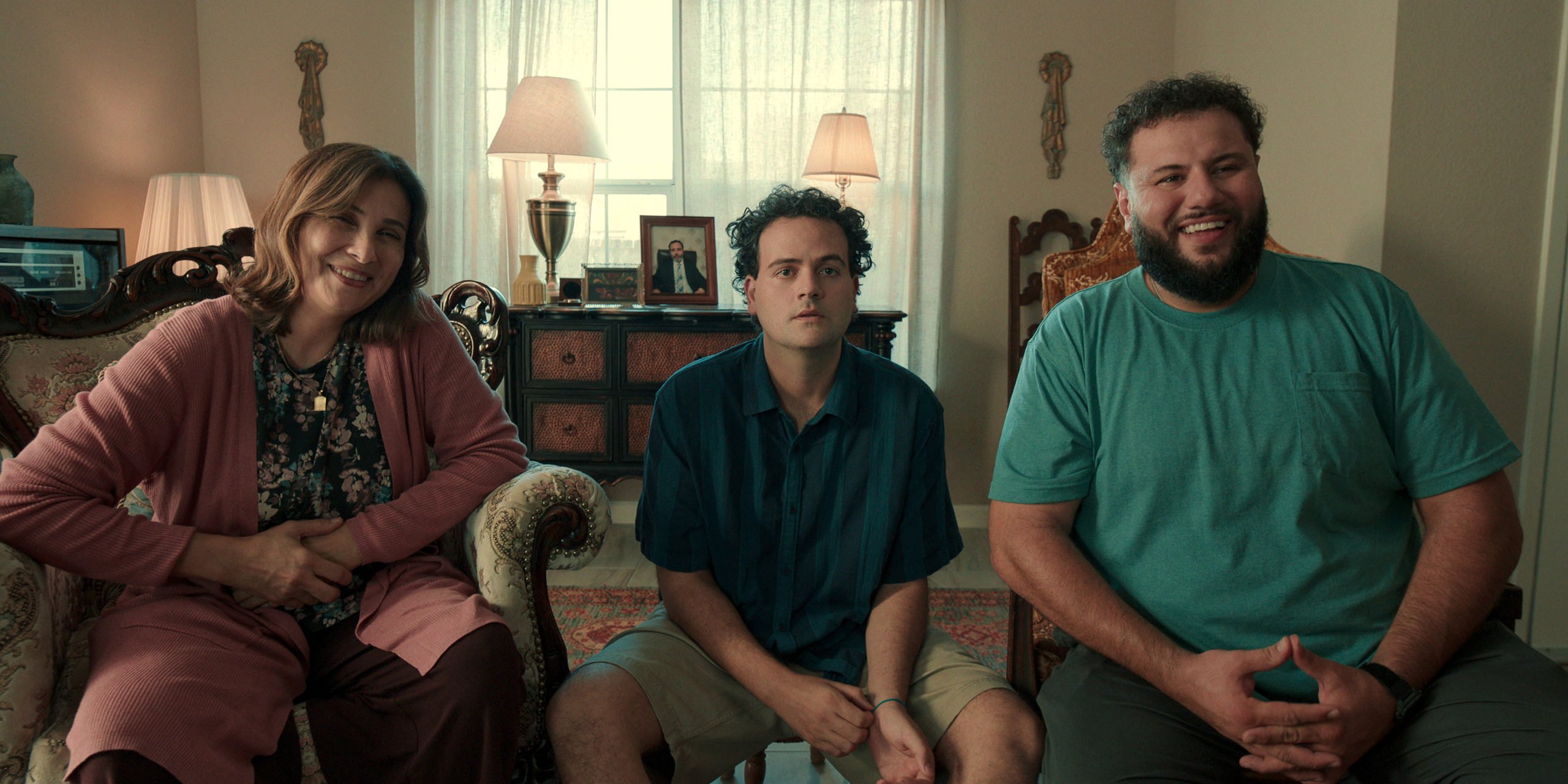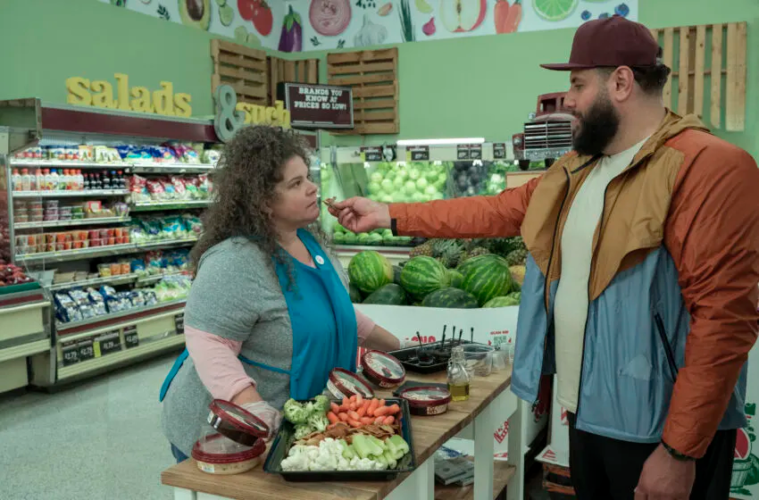One thing about Mo, a limited series that debuted on Netflix last month, is that it’s fast. Think diction-of-“Mattress Mack” fast. Fast in doling out gags that at minimum will redden your face and dramatic beats that address the tragicomic reality of people who call the United States their second home.
Minutes into the pilot, the lead character, Mo, a semi-autobiographical role played by Houston comedian Mohammed Amer, is placed on a riches-to-rags journey where he goes from a senior staffer at a cellular shop to a jobless Palestinian immigrant. Having no work permit is the reason cited. But what can he do when the only way to get it is to have his asylum case heard, though it’s been stalled in immigration courts for 22 years? Both heartaches and laughs ensue.
Meanwhile, for me, a realization strikes: I know this story. So many in Texas have lived or are living in this uncertain state of undetermined status. I, too, have known what job insecurity looks like. At one time, a now-defunct media station on Houston’s Bellaire Boulevard considered me essential for pitching and hosting a show—one about movies. But then I had to leave because of my short-term work papers. Since no one else could pick up the slack, the show was ultimately written off. It remains stunning to think all it took to upend my life was three letters. For me it was issues with OPT (the Optional Practical Training program, open to students before or after graduation); for Mo it was ICE (the threat of a raid by Immigration and Customs Enforcement).
Yet, as bitter as Mo’s departure from his main hustle is, there is a hilarious parting line he delivers to his boss (played by Bassem Youssef) that sprinkles in some sweetness: “How will you run this place? It’s my place—I mean, it’s your place, but I run it.”
I reckon this is the magic of Mo. It offers flashes of hilarity, but it is more than comedy. It also highlights a very particular limbo of immigrants that I find other scripted series rarely address so directly. It doesn’t take long for the show to have me feeling that the somewhat fictional Mo and I are offshoots of the same tree.
Mo highlights a very particular limbo of immigrants that I find other scripted series rarely address so directly.
In attempting to explain the deep connection I felt, I initially thought the answer was the setting: Houston. In lieu of, say, Los Angeles’ weather and New York’s art scene, Houston has an ability to make starkly different pieces and peoples seem cohesive—at times almost interchangeable. But it turns out our bond goes beyond geography and into identity, from where I am to who I am. Like Mo, I’m just one of many navigating life in the U.S. without the ability to truly check off the “all American” box.
Of Mo’s three listed focuses—“two cultures, three languages, and a ton of bullshit”—the last initially seems most apparent. Creators Ramy Youssef (of Hulu’s Ramy fame) and Amer mine many funny scenarios for Mo, who aside from being an asylum-seeker is also a trunk merchant, a lean addict, and a son (his mom, Yusra, is played by Farah Bsieso). Yet those pivots are also how the show builds its sturdiest link to the “not quite American” reality that Mo and I and many other Texans share. It sure is refreshing to see filmic art that speaks this truth.
Another familiar moment for me is in episode four, titled “Moola,” where Mo finds out that his girlfriend Maria (played by Teresa Ruiz) is being snubbed by her (thankfully short-lived) business partners, her of-Indian-descent friend Shila (played by Kausar Mohammed) and Shila’s affluent white husband Glen (played by Grant Redmond). During the couple’s house party, Shila is seen tasking Maria with chores like a master to a maid.

This sequence, though filled with over-the-top amusement, prompts me to reflect on times I felt I had to roll along with demeaning demands to reach certain goals or risk being seen as the troublesome minority. Believe me, I wanted to let that particular newspaper editor know that I found his remarks at my English being “obviously of second-language level” offensive. But it was either go along and finish the internship, or perhaps see it cut off halfway and then—surprise—“fall out of status.” For immigrants in the United States, visa conditions—often referred to as “status”—are the reason they can stay.
To rescue Maria from the Shila-Glen danger, Mo exits the ornate house party scene after dropping a funny truth bomb on Shila: “You haven’t been Indian since 2009.” How I wish I could have channeled Mo’s truth-telling nature, or that there had been a figure of his kind, to relieve me from the Vietnamese equivalents of Shila— people so clouded by their proximity to privilege, access, or power that they made the air nearly unbreathable.
Certain moments in episode six (“Holy Matrimony”), where Mo and his childhood friend Nick (played by Tobe Nwigwe) prepare Hameed (played by Moayad Alnefaie) for his wedding to a blonde, are also sobering.
Albeit unpleasant, I find jealousy is commonplace among immigrants, and the areas it can invade include looks, health, wealth, property, family, and legal status. I was once—or still am—trying to deprogram myself from such comparative resentment should I learn of a fellow Vietnamese who had better success in love or at work. Over a celebratory dinner or drinks, I would be the one with the dour attitude, much like Mo who can’t stop doubting Hameed’s marriage (“love as real as her hair”) even when everyone else has gone all in.
Fortunately, Mo comes to see that in the end, Hameed’s union is both the fulfilling of an objective—gaining legality—and the result of bona fide chemistry.
But, let’s say your reason to tune in is to tune out reality, Mo will still welcome you with pure entertainment. Note, however, that you will always feel balanced after a gag, fully earthbound after giggling all the way to cloud nine. Or vice versa.

Even when packed into one fast-paced exchange, the laughs don’t lose their flavor. Check out this one in the pilot when Mo reacts to a supermarket employee (played by Lori Z. Cordova) asking him to sample chocolate hummus:
Mo: “You know what you just did? You just insulted my grandmother. Yeah. ‘F*** your lineage, to hell with your culture.’”
Supermarket Employee: “Lo siento, I did not know hummus was Mexican.”
Mo: “It’s not Mexican! It’s Palestinian.”
Then, less than a minute later, there’s a shootout. This is America. And as Mo, who was grazed by a bullet, is about to be transported to the hospital, he shouts: “I’m refusing medical attention! I’m uninsured. I’m not paying $5000 for an ambulance ride.”
Have I told you that immigrant life in the U.S. is, generally, a tragicomedy waiting to be told?
Granted, Mo is mainly a fictitious creation, but he and his journey demonstrate with great flair and plenty of fun how to face matters when many in immigrant communities—especially my own—would prefer to instead apply the “stay down, stay quiet, stay fine” adage. As such, thank you, Mo, for letting me know myself better and be a bit braver as I continue life in my “home away from home.”
Love you much, my parallel brother.







